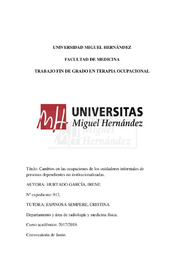Por favor, use este identificador para citar o enlazar este ítem:
https://hdl.handle.net/11000/26139Registro completo de metadatos
| Campo DC | Valor | Lengua/Idioma |
|---|---|---|
| dc.contributor.advisor | Espinosa Sempere, Cristina | - |
| dc.contributor.author | Hurtado García, Irene | - |
| dc.contributor.other | Departamentos de la UMH::Patología y Cirugía | es_ES |
| dc.date.accessioned | 2022-03-08T13:18:21Z | - |
| dc.date.available | 2022-03-08T13:18:21Z | - |
| dc.date.created | 2018-05-08 | - |
| dc.identifier.uri | http://hdl.handle.net/11000/26139 | - |
| dc.description.abstract | Introducción: El cuidado de un familiar enfermo, en ocasiones provoca un abandono o alteración de sus ocupaciones significativas y desde terapia ocupacional es necesario estudiar este abandono para establecer nuevas estrategias de intervención. Objetivos: Identificar las ocupaciones conservadas y las abandonadas. Identificar ocupaciones que les gustaría retomar. Identificar la cantidad de tiempo que dedican a cada actividad, durante un día cotidiano Material y método: Estudio transversal descriptivo exploratorio con muestra a conveniencia. Los criterios de inclusión fueron ser mayor de edad, cuidar a una persona con dependencia no institucionalizada y firmar el consentimiento informado. Se realizó una entrevista y se administró el Listado de intereses adaptados, la Escala de sobrecarga del cuidador y el Cuestionario Ocupacional. Resultados: El 63% de la muestra convive con el enfermo; el 45% presenta algún tipo de sobrecarga, siendo el ictus, la enfermedad que más sobrecarga ofrece. La relación familiar que más puntuación ofrece en la escala Zarit es la de hijos al cuidado de padres. El tiempo medio que dedican al cuidado es de 6´3h diarias, siendo considerada una actividad importante para un 73%. Todos los cuidadores del estudio, dedican algún tiempo semanal a realizar actividades recreacionales. Discusión: Comparando los resultados con otros estudios, observamos que el tipo de enfermedad, parentesco, tipo de convivencia y la implicación en los cuidados, puede afectar a las distintas áreas de ocupación y en la sobrecarga. Conclusión: Los cuidadores informales tienen abandonos, cambios y/o alteraciones en las diferentes áreas ocupacionales, debido a la dedicación de los cuidados del familiar dependiente | es_ES |
| dc.description.abstract | Introduction: The care of a sick relative sometimes causes an abandonment or alteration of their significant occupations and from occupational therapy it is necessary to study this abandonment to establish new intervention strategies. Objectives: Identify the conserved and abandoned occupations. Identify occupations that they would like to resume. Identify the amount of time they spend on each activity, during a daily day Material and method: Descriptive exploratory cross-sectional study with convenience sample. The inclusion criteria were to be of legal age, to care for a person with non-institutionalized dependence and to sign the informed consent. An interview was conducted and the List of adapted interests, the Caregiver Overload Scale and the Occupational Questionnaire were administered. Results: 63% of the sample lives with the patient; 45% present some type of overload, being the stroke, the disease that more overloads offers. The family relationship that offers the highest score on the Zarit scale is that of children in the care of parents. The average time devoted to care is 6'3h per day, being considered an important activity for 73%. All the caregivers of the study dedicate some time weekly to recreational activities. Discussion: Comparing the results with other studies, we observed that the type of disease, kinship, type of coexistence and involvement in care can affect the different areas of occupation and overload. Conclusion: Informal caregivers have dropouts, changes and / or alterations in the different occupational areas, due to the dedication of the dependent family care. | es_ES |
| dc.format | application/pdf | es_ES |
| dc.format.extent | 38 | es_ES |
| dc.language.iso | spa | es_ES |
| dc.publisher | Universidad Miguel Hernández de Elche | es_ES |
| dc.rights | info:eu-repo/semantics/openAccess | es_ES |
| dc.rights.uri | http://creativecommons.org/licenses/by-nc-nd/4.0/ | * |
| dc.subject | terapia ocupacional | es_ES |
| dc.subject | ocupaciones | es_ES |
| dc.subject | cuidador informal | es_ES |
| dc.subject.other | CDU::6 - Ciencias aplicadas | es_ES |
| dc.title | Cambios en las ocupaciones de los cuidadores informales de personas dependientes no institucionalizadas | es_ES |
| dc.type | info:eu-repo/semantics/bachelorThesis | es_ES |

Ver/Abrir:
TFG CAMBIOS EN LAS OCUPACIONES DE LOS CUIDADORES INFORMALES DE ENFERMOS DEPENDIENTES NO INSTITUCIONALIZADOS (Irene Hurtado García).pdf
1,2 MB
Adobe PDF
Compartir:
 La licencia se describe como: Atribución-NonComercial-NoDerivada 4.0 Internacional.
La licencia se describe como: Atribución-NonComercial-NoDerivada 4.0 Internacional.
.png)